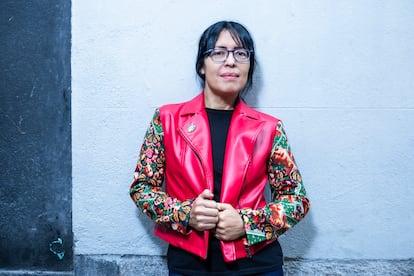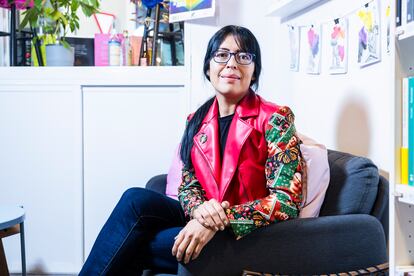Frida Cartas: ‘When I was young, I asked the Virgin Mary if she could give me the gift of death for Christmas’
The Mexican writer just published ‘Transporte a la infancia,’ a story of violence and love through her memories as a young trans girl who, in many ways, was saved by her mother

Frida was always Frida even if they put Alfredo on her birth certificate, and even if neither she nor anyone around her knew she was trans. She would learn “the name,” just the name, the definition: trans woman, years, many years, later. Everyone else would not. Now, at 44 years old, Frida Cartas, a Mexican who was born in Mazatlán, in the state of Sinaloa, has published a book that was not going to be a book, but rather, “a gift” to her mother, Lubia, “so that these memories never die.” As dark as those memories may be, because Transporte a la infancia [A trip back to childhood] is love but it is also violence in an equilibrium that was sometimes arrived to the point of being impossible to maintain, inside and outside the home, and was always affected by social class: “maricón,” “puto,” “joto” — Spanish words for “faggot” — rapes, abuses, mistreatment, contempt, and humiliations to which she was subjected by male and female classmates, boys and girls, teens and adults, also her father, and which that woman, her mother, cushioned with what she says was a “a clawed defense.”
Question. In the book there is a constant contrast between very distinct types of violence and your mother’s love, and also that of your sisters.
Answer. It’s very painful, it’s a book full of wounds, but the process of writing it was very healing and made me conscious of the fact that there are things that will remain open, and that it’s OK to stop feeling guilty that I haven’t been able to heal some of these things.
Q. Some of them weren’t just outside your home, they happened inside it.
A. What happened inside the house was at times far beyond what I could bear. It was normal for me to feel as though I could breathe inside the house, and not in the street, but sometimes I felt that I had to go out because I could not breathe inside. Today is December 12, the day of the Virgin of Guadalupe, Mexico’s most emblematic figure. When I was a little girl, I prayed to the Virgin “I want to die, I want to die,” I asked her if she could bring me the gift of death for Christmas, if I could go to heaven with her. While I was writing this book, I was thinking about what has to happen for a 10-year-old girl to want to die.
Q. Suicide or attempted suicide among minors is something that is being increasingly talked about.
A. Yes, also in the process of writing this book I came across some numbers: right now, in Mexico, three children commit suicide every day, and it has nothing to do with being trans, but rather depression, pain, torture. The world is very cruel with the young, not just in my country but in the entire world: wars, forced displacement, migration.
Q. How important is protection by mothers and fathers in the context you’re referring to, and in your own experience?
A. The biggest emphasis should be on caring for the mental health of these future adults. When there’s also a sexual difference, there are problems of guilt and shame, which isn’t natural, but rather naturalized. My mother’s accompaniment was very loving, she had her claws out to defend me, but she did not have the pedagogy to be able to explain that who I was, was OK, and she couldn’t help me with the shame and the guilt. I think that a pedagogic sequence is necessary, I don’t know if it needs to be academic, but knowing the language for the basic, like the “abc’s” of trans; and at the same time not putting down your claws, that defense for the most vulnerable boys and girls, whether they are cisheteros or gay or lesbian or trans.
Q. And socially, how necessary do you find that pedagogy?
A. With what we are seeing now, political confrontations and in discourses, it seems to me that people don’t even make themselves available to understand that difference, but rather there is a push to criminalize and satanize. There needs to be an end to criminalization, because that doesn’t have anything to do with the pedagogy, but rather something that is more human, more empathetic, with more solidarity, that sees that everyone is different in some way. “Tú también tienes cola que te pisen,” [”You too have a tail to be stepped on”] as we say in Mexico.

Q. How do you see this reflected within the feminist movement?
A. I came to feminism in 2010, when I began to read theory, and it seemed like a safe space. Nowadays it does not, but I do regard it as absolutely necessary. Its disputes come from repeating history’s mistakes; at one point, lesbians were also attacked because they refused to get married and have children. As Audre Lorde says, “It is not our differences that divide us. It is our inability to recognize, accept, and celebrate those differences.” There has been bad faith in not wanting to listen, in not wanted to sit down with each other, but rather to attack each other, in public and in the media, in marches and protests.
Q. Solution?
A. To sit down with each other in more private places, away from the internet, to be able to listen to each other and not leave until we manage to understand that it’s not about being friends, but that we do need to come together. I think that the idea of power has consumed many feminists a bit, the idea that they were there first and fought so much, and now they think that a trans woman is going to take away this space of power. And that’s not it. It is precisely the trans person who has been beaten by power: you have to blow power up, rather than aspire to have it as status.
Q. Must we also blow up certain perceptions about how feminism understands domestic care and chores? In your book you talk about how you always liked cleaning and cooking and that it alleviated stress, that you always felt like a caretaker. Do you think that was due to gender’s roles and commands?
A. When I go out on the street with my boyfriend and his son, who I have taken care of since he was born, the world reads us as a cisheterosexual woman with her spouse and child, and that kind of reading brings you to those patriarchal archetypes. But I, for example, am bisexual, we have an open relationship and the care I provide has nothing to do with gender roles. These social readings are not able to see these points of departure from normativity. And in regards to the question about chores, it is precisely feminism that allows me to see that caretaking [of people or of the home] is work. When I began to work in caretaking, cleaning, it was because they are things that I know how to do, that I like and that relax me, and I began to monetize them. It is work and it needs to be referred to as such. On my resume, for example, I have written housewife and writer, and sometimes in interviews they won’t name those things, they take them out, they make them invisible.
Q. Have you ever wanted to be that, invisible, due to the violence that surrounded you? When did you first recognize that violence?
A. I was about seven years old when I woke up one night to the screams of neighbor whose husband, a military friend of my father [who was also in the military], was beating her. My mother woke up and ran out, opened the door to save the neighbor, and I remember that I ran after her. In that moment, I realized that I thought this kind of violence was normal, that it took on other forms but was normal within my own home, that it was also normal around us, among our neighbors, and that it was normal in the world. In the street, girls, boys, beat me, little kids called me puto, marica [yet another word for “faggot”] and joto. When I left, I realized that even I had violent reactions and getting rid of them has been a difficult task, it doesn’t stay in your body like an infection, but that violence can rot you. Even if it was self-defense. Now, part of that self-defense lies in my writing.
Sign up for our weekly newsletter to get more English-language news coverage from EL PAÍS USA Edition
Tu suscripción se está usando en otro dispositivo
¿Quieres añadir otro usuario a tu suscripción?
Si continúas leyendo en este dispositivo, no se podrá leer en el otro.
FlechaTu suscripción se está usando en otro dispositivo y solo puedes acceder a EL PAÍS desde un dispositivo a la vez.
Si quieres compartir tu cuenta, cambia tu suscripción a la modalidad Premium, así podrás añadir otro usuario. Cada uno accederá con su propia cuenta de email, lo que os permitirá personalizar vuestra experiencia en EL PAÍS.
¿Tienes una suscripción de empresa? Accede aquí para contratar más cuentas.
En el caso de no saber quién está usando tu cuenta, te recomendamos cambiar tu contraseña aquí.
Si decides continuar compartiendo tu cuenta, este mensaje se mostrará en tu dispositivo y en el de la otra persona que está usando tu cuenta de forma indefinida, afectando a tu experiencia de lectura. Puedes consultar aquí los términos y condiciones de la suscripción digital.









































